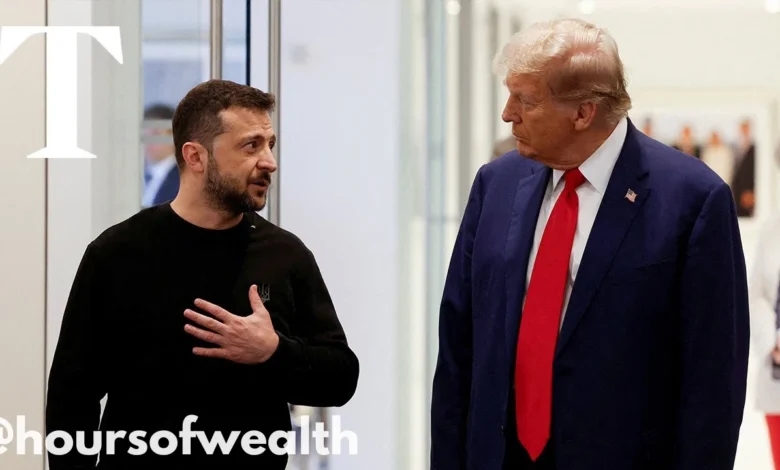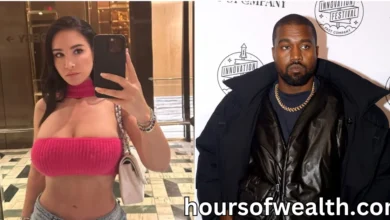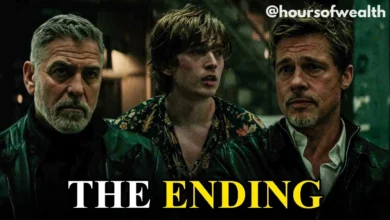Trump’s Remarks on Zelensky and Putin Spark Controversy Ahead of Key Meeting

Former U.S. President Donald Trump has once again found himself at the center of controversy following his recent meeting with Ukrainian President Volodymyr Zelensky. In a delicate balancing act, Trump called Zelensky a “friend” while also praising his close relationship with Russian President Vladimir Putin. These remarks come at a crucial time as Ukraine seeks continued U.S. support in its fight against Russian aggression. Trump’s claims of being able to broker peace if re-elected have drawn mixed reactions, raising questions about his diplomatic intentions and the future of U.S.-Ukraine relations.
1. Trump and Zelensky’s Relationship
Donald Trump and Volodymyr Zelensky have shared a complex relationship, shaped by both cooperation and controversy. During the recent meeting, Trump referred to Zelensky as a “friend,” highlighting a positive rapport between the two leaders. This friendly tone contrasts sharply with their past, particularly the 2019 impeachment proceedings, which centered around Trump’s alleged pressure on Zelensky to investigate political rivals in exchange for military aid.
Despite the tumultuous history, Trump’s latest comments suggest a desire to maintain cordial ties with Zelensky. However, the conversation quickly took a surprising turn as Trump shifted focus to his relationship with Vladimir Putin.
2. Praise for Putin: A Bold Move
In a move that has drawn significant global attention, Trump openly praised his “good relationship” with Russian President Vladimir Putin. This comes amid the ongoing conflict between Ukraine and Russia, where Putin’s actions have been widely condemned by the West. Trump’s remarks about Putin have raised eyebrows, especially as he framed his relationship with both Zelensky and Putin in nearly equal terms.
For many political analysts, Trump’s praise for Putin during such a delicate moment in international relations was seen as a risky diplomatic gesture. It further emphasized Trump’s unique foreign policy approach, which often involves maintaining ties with controversial leaders. The question remains: what does Trump’s alignment with Putin mean for Ukraine, especially at a time when the country is desperately seeking more Western support?
3. Zelensky’s “Victory Plan” and the Request for U.S. Support
While Trump’s statements attracted most of the headlines, President Zelensky had his own agenda for the meeting. The Ukrainian leader used this opportunity to promote his “victory plan” for Ukraine, a strategy focused on defeating Russian forces and restoring peace to the region. Zelensky’s plan hinges heavily on continued U.S. military and financial support, which has been critical to Ukraine’s resistance.
Zelensky’s message was clear: Ukraine needs more assistance from its Western allies to achieve victory. His appeal to Trump, and by extension to U.S. voters, underscored the high stakes for Ukraine as it navigates the challenges of war. For Zelensky, securing unwavering American support is essential to his plan’s success.
4. Trump’s Claims: Peace Negotiator or Diplomatic Risk?
Amid the backdrop of war, Trump positioned himself as a potential peacemaker, boldly claiming that he could negotiate peace between Ukraine and Russia if re-elected. “It takes two to tango,” Trump said, implying that both sides must be willing to come to the table for peace talks to succeed.
Trump’s claim raises several questions. Can he realistically broker peace in one of the most complex geopolitical conflicts of our time? His diplomatic track record shows a mix of unconventional successes and controversial decisions, including his dealings with North Korea and NATO. While Trump’s confidence in his negotiation abilities is high, many critics argue that aligning closely with Putin could undermine any potential peace efforts and harm U.S. credibility on the global stage.
5. Reactions to Trump’s Remarks
Unsurprisingly, Trump’s remarks sparked a wave of reactions both in the U.S. and abroad. Political figures from both sides of the aisle weighed in, with some praising Trump’s diplomatic vision and others criticizing his apparent coziness with Putin. Zelensky, while focused on his victory plan, has remained cautious in publicly reacting to Trump’s statements, likely aware of the importance of U.S. political dynamics in determining Ukraine’s future.
Media outlets and commentators expressed a wide range of opinions, with some viewing Trump’s statements as a potential game-changer and others seeing them as a diplomatic misstep. International reactions mirrored this divide, with some European nations voicing concern over Trump’s praise for Putin, while others viewed his willingness to negotiate peace as a positive step.
6. The Bigger Picture: Ukraine’s Struggle and Global Stakes
The broader context of Trump’s remarks is Ukraine’s ongoing war with Russia, a conflict that has had devastating consequences for both countries and the wider world. Since the invasion began in 2022, Ukraine has relied heavily on U.S. and NATO support to counter Russian aggression. Trump’s comments, particularly his praise for Putin, raise concerns about what a future Trump presidency might mean for that support.
At the same time, Trump’s call for peace negotiations hints at the need for a diplomatic solution to the conflict. However, any peace deal would require careful balancing of the interests of both Ukraine and Russia, as well as the support of the global community. With the world watching, the stakes could not be higher for Ukraine, the U.S., and global stability.
Conclusion
Trump’s meeting with Zelensky, and his remarks about Putin, have added another layer of complexity to the ongoing conflict in Ukraine. As the 2024 U.S. presidential election approaches, Trump is positioning himself as both a friend of Zelensky and a potential peace negotiator with Putin. Whether this strategy will resonate with voters and the international community remains to be seen. For now, the world watches as Ukraine fights for its future, and Trump offers a diplomatic path that could change the course of the war.




One Comment